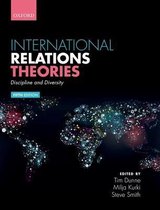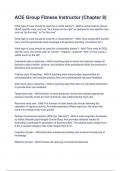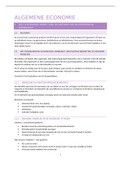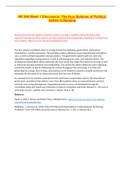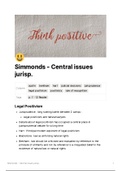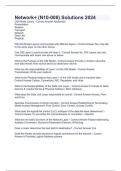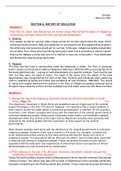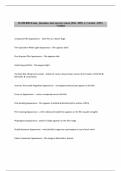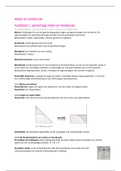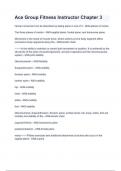1
Research Design Analysis
One of the major analysis tools in any context is carrying out research. In doing the
research, there are various stages that the researcher has to go through to achieve their goals.
One of those steps, and the first step, is to understand and define the research question or the
research question that forms the research framework. In this paper, the aim is to understand
the research question. Hence, the researchers' fundamental analysis of research in the
Columbia University and international rescue committee.
In this research, the research question is how people behave under certain conditions,
such as unemployment. The question is whether there is increased rebellion and crime rate
due to various underlying factors in a given location. Investigate what can be done to a
certain target group, such as ex-military men, to reduce the chances of conflicts arising
concerning that target group and whether they cause this chaos and wars resulting from
experience and recruitment. The researcher can view the solution to that particular problem
from whether employment in the target groups can reduce lawlessness and rebellion. The
hypothesis that has been advanced in this research is that among the certain target group, an
increase in the rate of employment among the high-risk men would consequently lead to an
increase in reduced rebellion, and therefore lawlessness would reduce. The analysis to be
done would be to establish whether this claim (hypothesis) is true and the evidence will be
given followed by a conclusion based on the hypothesis stated.
To be able to carry out research and make an analysis, there have to be variables that
are under the study. These variables can be independent, the variables whose existence and
operation do not depend on any other variable. There are also the dependent variables whose
operation and variation depend on other variables or another variable. That is, they depend on
the independent variables. People's lawlessness and rebellion can be viewed as the dependent
variable in this research. This rebellion translates to their behavior since its existence is
, 2
affected by other factors. On the other hand, the independent variable is the prevailing social
and economic conditions such as farming activities, employment increase, and income
increase, affecting how the people behave in the long run.
The variables are defined conceptually in this research in different ways. For instance,
the behavior is described to have increased and hence conceptually defined as better than it
used to be before subjection to a better environment. In the conceptual definition, training
pieces were carried out and altered how people think about how they should earn their
income and embrace personal efforts other than going the criminal way (Blattman & Annan,
2016, p. 6). In a certain scenario, it is said that the high-risk men are said to be less likely to
commit crimes where this cannot be measured quantitatively, but it is evident. “A second
caveat is that it is difficult to say why the program made men less likely to commit crimes or
rebel. This a recurring limitation of quantitative studies of rebellion: we cannot measure
motivations.” (Blattman & Annan, 2016, p. 3). The researcher can define the empirical and
operational measurement in terms of a variable. The article clearly stated that the crime rate
decreases in developing countries with increased wages since people can get what they need
(Blattman & Annan, 2016, p.1). Likewise, the crime rate has gone down in "the hotspot"
areas since most high-risk men have shifted their energy to the agricultural sector.
In this research, it is found that various variables have been held constant. One of the
variables is the group of people under research and their accompanying behaviors. This target
group is the one that is under study, and then it has to be monitored over time and any
changes recorded, and this is the reason the population is held a constant. The target group is
held constant, which is why it is viewed as the dependent variable. According to this
research, the high-risk men from various locations are viewed as the constant variable. They
are viewed so because they are not varied but are subjected to various conditions that vary,
and their response towards those factors is observed.
Research Design Analysis
One of the major analysis tools in any context is carrying out research. In doing the
research, there are various stages that the researcher has to go through to achieve their goals.
One of those steps, and the first step, is to understand and define the research question or the
research question that forms the research framework. In this paper, the aim is to understand
the research question. Hence, the researchers' fundamental analysis of research in the
Columbia University and international rescue committee.
In this research, the research question is how people behave under certain conditions,
such as unemployment. The question is whether there is increased rebellion and crime rate
due to various underlying factors in a given location. Investigate what can be done to a
certain target group, such as ex-military men, to reduce the chances of conflicts arising
concerning that target group and whether they cause this chaos and wars resulting from
experience and recruitment. The researcher can view the solution to that particular problem
from whether employment in the target groups can reduce lawlessness and rebellion. The
hypothesis that has been advanced in this research is that among the certain target group, an
increase in the rate of employment among the high-risk men would consequently lead to an
increase in reduced rebellion, and therefore lawlessness would reduce. The analysis to be
done would be to establish whether this claim (hypothesis) is true and the evidence will be
given followed by a conclusion based on the hypothesis stated.
To be able to carry out research and make an analysis, there have to be variables that
are under the study. These variables can be independent, the variables whose existence and
operation do not depend on any other variable. There are also the dependent variables whose
operation and variation depend on other variables or another variable. That is, they depend on
the independent variables. People's lawlessness and rebellion can be viewed as the dependent
variable in this research. This rebellion translates to their behavior since its existence is
, 2
affected by other factors. On the other hand, the independent variable is the prevailing social
and economic conditions such as farming activities, employment increase, and income
increase, affecting how the people behave in the long run.
The variables are defined conceptually in this research in different ways. For instance,
the behavior is described to have increased and hence conceptually defined as better than it
used to be before subjection to a better environment. In the conceptual definition, training
pieces were carried out and altered how people think about how they should earn their
income and embrace personal efforts other than going the criminal way (Blattman & Annan,
2016, p. 6). In a certain scenario, it is said that the high-risk men are said to be less likely to
commit crimes where this cannot be measured quantitatively, but it is evident. “A second
caveat is that it is difficult to say why the program made men less likely to commit crimes or
rebel. This a recurring limitation of quantitative studies of rebellion: we cannot measure
motivations.” (Blattman & Annan, 2016, p. 3). The researcher can define the empirical and
operational measurement in terms of a variable. The article clearly stated that the crime rate
decreases in developing countries with increased wages since people can get what they need
(Blattman & Annan, 2016, p.1). Likewise, the crime rate has gone down in "the hotspot"
areas since most high-risk men have shifted their energy to the agricultural sector.
In this research, it is found that various variables have been held constant. One of the
variables is the group of people under research and their accompanying behaviors. This target
group is the one that is under study, and then it has to be monitored over time and any
changes recorded, and this is the reason the population is held a constant. The target group is
held constant, which is why it is viewed as the dependent variable. According to this
research, the high-risk men from various locations are viewed as the constant variable. They
are viewed so because they are not varied but are subjected to various conditions that vary,
and their response towards those factors is observed.

